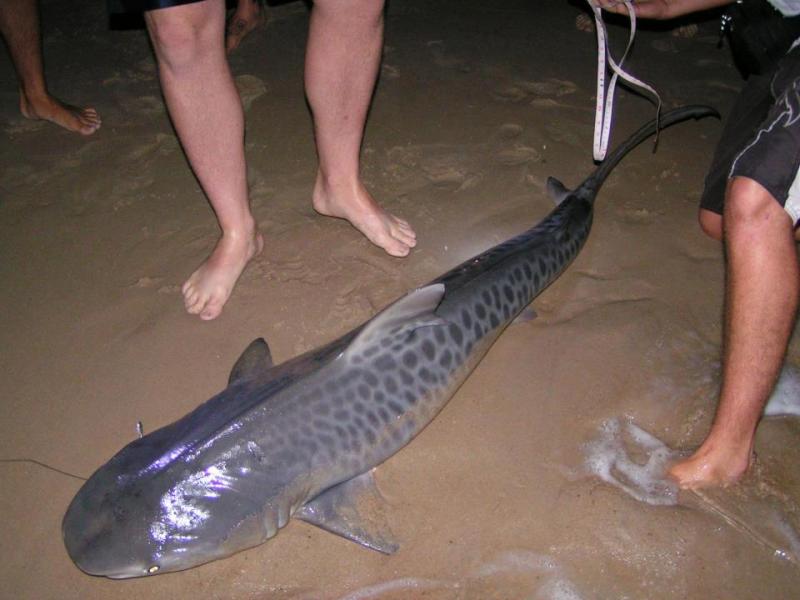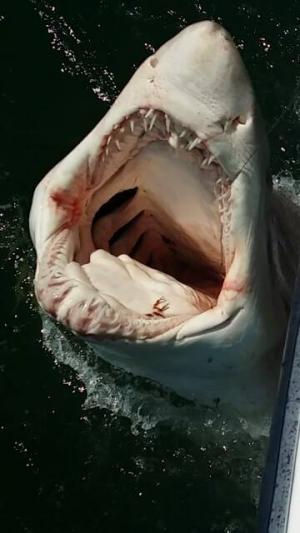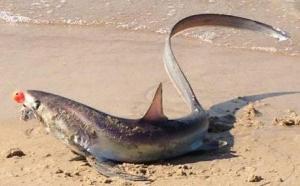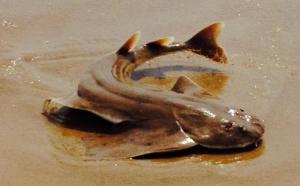Variety of choices in fishing and a few surprises
Is it June already? Slow down, summer, we got things to do! You wouldn't know it from the fishing; we still have the early spring fish around and the summer species are here too; well, almost all of them. Makes for a variety of choices and a few surprises fishing. One guy was fishing for kingfish with a top and bottom rig from DS Custom Tackle and landed a 43-inch striped bass. You just never know what you will catch this time of year. I always tell people to go with low to no expectations; it makes for a better day. Nothing like ruining your and everyone else's day because you didn't land that fish of a lifetime.
The surf fishing has been productive for most. The dogfish and skate catches always are numerous this time of year. The only way to cut down on those catches is not to use cut bait. Spot, croaker, sand perch, northern kingfish, weakfish, puffer fish, burrfish, short striped bass and the occasional bluefish are all being caught. Top and bottom rigs in the summertime work just fine for most species, with bloodworms or the artificial bait Fishbites. These have a variety of flavors or scents – bloodworm, sand worm, sand flea, crab, clam, and a variety of colors for some of those flavors. Hands down, they’re the best artificial bait out there. No mess or fuss, either. The blue packages are for the warmer water. The red packages are a fast-acting formula that dissolves quicker and works great in colder water. We have even used the bloodworm Fishbites for trout in streams up north and it works. Makes fishing with kids real easy. When compared to real bloodworms, Fishbites holds its own rather well. We have tested that numerous times in the surf and at the piers.
Migratory striped bass are still being caught on occasion. Much later in the spring this year for Delaware and along the coast for once. Very random catches, but targeting them is not a bad idea. Bunker chunks for the bait, which will also attract the scavengers and sharks. The short bass action has been fun around the area waterways and surf. Using small swim shads or spoons to catch them.
The Cape Henlopen fishing pier has seen decent action for this time of year, especially flounder. Gulp has been the best bait for jigging along the pier pylons. At high tide you can catch flounder right along the edge of the bay beaches around this pier. The fly anglers do really well when they target flounder in the flats. We call the shallows “the flats” around the pier and the area in Delaware Seashore State Park at Tower Road and New Road. Another good place to wade, fish and catch crabs. Only difference is those flats are in the Inland Bays.
Weakfish are still making an appearance in larger sizes. Mostly the spike trout or small ones are in the surf, but there are some big ones being landed. Just fish; don't bother targeting them. These larger fish have been a total surprise for the anglers landing them.
The head boats and charters are starting to do better. Call to check on trips and prices. The offshore action is starting to hit – it’s way offshore now, but will move in closer soon enough.
Sharks are here, and many need to know the rules for shark fishing in Delaware. About 99% of the sharks caught in the surf are prohibited from being removed from the water.
Shark Fishing In Delaware: The Rules Clarified
This was written three years ago, but it still applies. Know the rules for shark fishing in Delaware!
I have been working on getting some better information to anglers about shark fishing in Delaware and the rules to be followed. We all have our own ways of interpreting the guidebook, and the information put in there can vague. There are more detailed rules for handling sharks (https://regulations.delaware.gov/AdminCode/title7/3000/3500/3508.shtml) at the DNREC website.
I met Sgt. Troy Trimmer and Sgt. Greg Rhoades DNREC Fish and Wildlife enforcement for an interview about clarifying the rules for shark fishing and possession. I would like to thank the officers for meeting me and taking a day away from their normal routine. These boys spend a lot of time on the go trying to enforce the state’s laws.
They have a tough job, and I learned just how tough as the interview progressed. The word proactive came up a few times; let’s face it, they deal with people who have knives and/or guns all day. Here are some questions and answers.
The guidebook states that the shark is to be immediately released, so what is the definition of immediately released? “As soon as the shark is identified, it is to be immediately released if it is a prohibited species, or if you do not know, then immediately let it go.”
What is meant by maximum probability of survival? “Sharks that are beached might have a 50/50 chance of surviving.
“This rule was put into use a few years ago when many sharks were washing up onto the beaches in Ocean City, Md. We found that the ones that were being caught in the surf in Delaware and beached were dying.
“The weight of the animal crushes its internal organs, and the shark may swim away only to die later from injuries sustained due to the beaching process, and then wash up on public beaches. Once the rule was in effect and enforced, the sharks stopped washing up on the beaches.”
I know that beaching a shark is banned by the rules concerning prohibited species, since that would mean removing the animal from the water.
Where do you consider the water to end and the beach to begin? (Boaters are not to remove sharks from the water either.)
“The whitewater in the surf is the closest to shore you can bring in the shark; the definition of land comes into play here.”
Where exactly is that? The wash, as I have always called it, is where the sand is exposed between waves; is that considered the whitewater?
“No, the whitewater is where the waves flatten out behind the first wave. This way the shark is still in the water at all times.
“Remember, as the animal must be identified first, it is not to be removed from the water in case it is a prohibited species.”
Is it illegal to fish for or target prohibited species? “No.”
I have heard of some people being fined for pictures with prohibited species out of water – is this a fineable offense?
“Yes, it is considered possession of a prohibited species in Delaware.”
What are the fines involved? “The fines can be from $76.50 to $700 including court costs.
“The actual fine itself is $25.”″
That seems rather cheap considering the fines for other offenses in Delaware. “Yes, that is something we would like to see raised so it is more of a deterrent.”
Rule of thumb: If you cannot ID the shark, let it go per the rules for a prohibited species.


























































